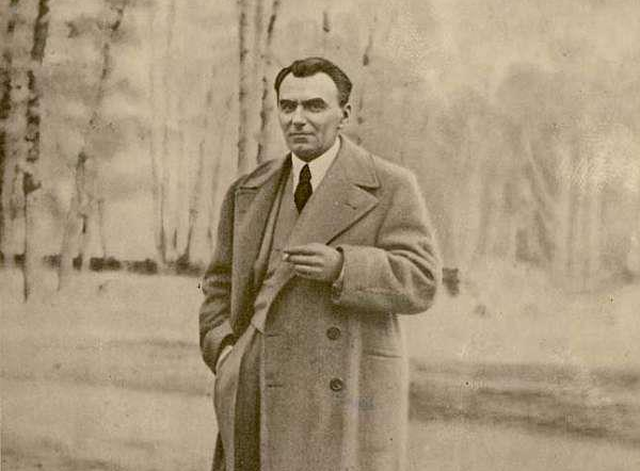Nae Ionescu, Angel and Demon
Historical eras are sometimes marked by strong personalities, be they in politics, social life or culture.

Steliu Lambru, 03.03.2014, 13:23
Historical eras are sometimes marked by strong personalities, be they in politics, social life or culture. Strong personalities are influential people, trend setters, and quite often controversial. In interwar Romania, one of the most controversial figures was philosopher and professor Nae Ionescu, a proponent of nationalism and anti-Semitism and an adept of the Romanian version of existentialism. He was director of the Cuvantul magazine, and many important Romanian interwar intellectuals were shaped by his school, such as Mircea Eliade, Mircea Vulcanescu, Mihail Sebastian and Emil Cioran. He was politically involved, he supported King Carol II, and then became a mentor of the Fascist Iron Guard.
Nae Ionescu was born in Braila in 1890. He graduated from the University of Bucharest in 1912, and then taught high school. In his youth he was a socialist, then he migrated to fascism. In the 1920s and ‘30s, he gained notoriety as a journalist with an incisive style. He was also active in hip social circles, having affairs, among others, with musician George Enescu’s future wife.
In spite of his qualities, it was in 1938, with great difficulty, that Nae Ionescu managed to become a professor at the School of Letters and Philosophy, under philosopher Petre Negulescu. Nae Ionescu stood out from the start as an intellectual who was against traditional customs of academic culture and the official political culture in Romania at that time. He was controversial for both the right and the left, for the cultural mainstream in the academia and in public opinion, according to historian Florin Muller from the Bucharest University School of History:
Florin Muller: “He was praised by Mircea Eliade in the most enthusiastic language, while also being accused in the most serious terms by the Marxist left and by rationalist intellectuals like Tudor Vianu, Serban Cioculescu and Mihai Ralea. Nae Ionescu was assessed by very different intellectuals in strongly contrasting terms. For Eliade, Ionescu was a philosophical brain, a truly reflective mind. Without being popular, Nae Ionescu always cultivated creative, dynamic and heroic elements. For Mihail Sebastian, a contributor to Cuvantul magazine, a Jewish intellectual who was very close to Nae Ionescu, the philosopher was a true moral guide. This meant that Ionescu allowed the creative forces of young intellectuals to be unleashed. These very favorable images were counterbalanced by the radically negative image presented by left wing rationalist academic intellectuals. One of them, the radical communist Lucretiu Patrascanu, believed Nae Ionescu to be a typical example of the decay of Romanian intellectuals, only interested in social climbing, with no foundation, no desire for truth, a two faced individual. Ionescu, in Patrascanu’s opinion, only distorted thinking, promoting the most egregious nationalist and anti-Semitic policy. There were also voices on the radical right, like Nichifor Crainic, who saw Nae Ionescu as one who had used unscrupulous instruments to become director of the magazine Cuvantul, doing everything to bury the spirit of fair competition and fair nationalist politics typical of Cuvantul around 1926-1927.”
Historian Florin Muller says Ionescu was a proven plagiarist, but he insists on providing the nuances of the context in which that happened:
Florin Muller: ”Zevedei Barbu is one of the people who analyzed and noticed the similarities, the near plagiarism that Nae Ionescu produced, comparing them to works by western scholars like Spengler. Barbu noticed certain themes and passage were copied, along with phrases and examples. Max Scheler is another author who was used in an almost fraudulent way by Nae Ionescu. In strictly technical terms, Nae Ionescu practiced a form of fairly visible plagiarism, which should be thoroughly rejected by the academia. At the same time, for Nae Ionescu it was important for these ideas, concepts and spiritual configurations to become a part of the intimate structure of the creator, and only then could one talk about internalizing them and properly conveying them in the consciousness of others. Nae Ionescu is in an area between parallel mirrors, he was seen as a creator of consciousness, a mentoring spirit for nationalism, anti-Semitism, and against democracy.”
Ionescu’s thinking was not constant, and Florin Muller says that his political opinions and attitude were influenced by historical events:
Florin Muller: “What is the outline of Nae Ionescu’s political thinking between 1924 and 1940, the year of his death? It had three stages. The first one tried to build a model of real mass democracy, of peasant orientation. The second was the justification of divinely appointed monarchy, a marginal theory in Romanian political thinking, which belongs more in the Middle Ages than in modern times. The last stage, which began in 1933, was that of extolling the totalitarian, collectivist and even crypto-socialist model of the Legionnaire movement. Why are these three stages important? Because the anti-Semitism issue takes distinct forms in the three stages of his thinking.”
Nae Ionescu died in 1940 under suspicious circumstances, which fed all sorts of rumors. However, the fascination and revulsion he sparked in others defined him as a strong personality, an angel and a demon all at once.






























